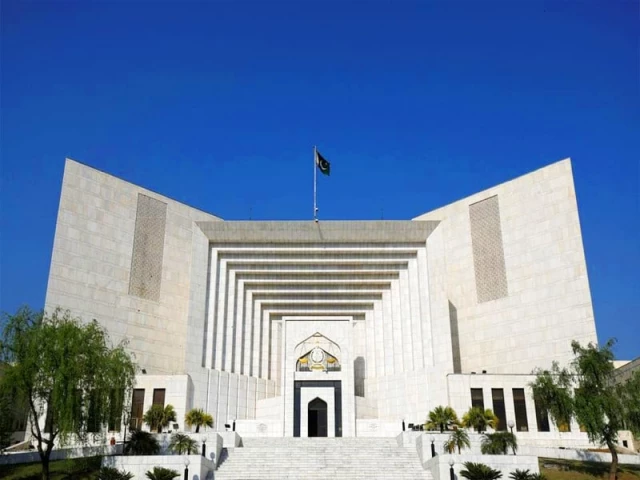A constitutional bank of eight judges (CB) of the Supreme Court (SC) assumed a group of statements that challenged the 26th constitutional amendment, legislation that requested the judicial authority, reduced the rules of tenure and caused a fierce debate about the independence of the judicial.
The Bank indicated that it would first address the requests that ask for the formation of a complete court, before resorting to requests that seek live transmission of the procedures.
Tehreek-i-Tahaffuz Ayeen-i-Pakistan President Mustafa Nawaz Khokhar was represented by lawyer Shahid Jameel, who presented an appeal for the constitution of a complete court. Jameel told the court: “Objections were raised in our request regarding the formation of a full court.”
After deliberation, the bank ordered the request to register formally.
Khawaja Ahmad Hosain, lawyer of the former president of the Supreme Court Jawad S. Khawaja, requested that the procedures be broadcast live. “The whole nation wants to see what is happening,” he said. In addition, he argued that hearings on the request that seek the formation of a complete court bank should also be broadcast live.
Khyber-Pakhtunkhwa’s government representative declared: “We don’t have a personal objection to any judge in the bank.”
The lawyer Salahuddin argued that “all citizens should have access to public importance.” He argued that amendment 26 was approved “on the night of the night”, without public debate, and requested greater transparency.
In a decision that favors the petitioners, the Supreme Court has granted approval for the live broadcast of the procedures related to the 26th constitutional amendment.
The case has been postponed until tomorrow.
The 26th consitional amendment
The 26th Constitutional Amendment Law, 2024, introduced long -range reforms to the Judicial System of Pakistan. Approved in October 2024, the law eliminated the SUO MOTU powers of the Supreme Court under article 184 (3) of the 1973 Constitution, set a three -year period for the president of the president of Pakistan instead of the traditional succession based on antiquity, and authorized the prime minister, through a parliamentary committee, to designate the next judge among the three highest judges.
He also restructured the Judicial Commission of Pakistan and altered the bank formation powers, expanding the role of Parliament and the Executive. The amendment also demanded that the State eliminate the RIBA (interest) of the financial system before January 1, 2028.
The bank and the supplications
A Constitutional Bank (CB) of eight judges of the Supreme Court, headed by Judge Aminuddin Khan, is listening to the requests that challenge the 26th Constitutional Amendment Law, 2024.
There were 36 requests, present by associations of lawyers of the Superior Court, the Pakistan Tehreek-E-Insaf (PTI), the actors of civil society and the former judges, which is of the legislative process, the constitutional validity and the impact on the judicial independence derived from the amendment.
The petitioners have urged the Court to demolish the entire amendment for reasons of procedural implication, arguing that the two -thirds parliamentary majority required by virtue of article 239 of the 1973 Constitution for a constitutional amendment may not have secured.
Alternatively, they seek to invalidate specific clauses, particularly those related to the appointment of the president of the president of Pakistan (CJP), the performance evaluations of the judges by the Judicial Commission of Pakistan (JCP) and the structure of the Constitutional Bank introduced through the amendment. The pleas also require restorating the original article 175a (3), which foresaw the appointment based on the antiquity of the CJP.
The petitioners also argue that the laws subsequently promulgated, such as the Law of the Supreme Court (practice and procedure), 2024, are not valid, since they flow from what they describe as an unconstitutional base.
Several petitioners have also requested that the case be heard by the Complete Supreme Court instead of the CB formed under the disputed amendment, citing the severity of the constitutional questions at stake.




